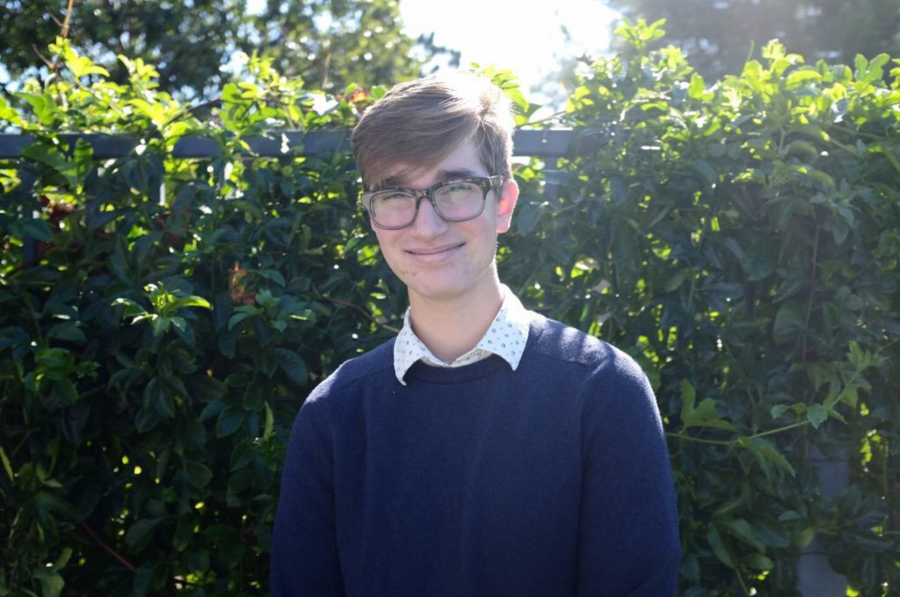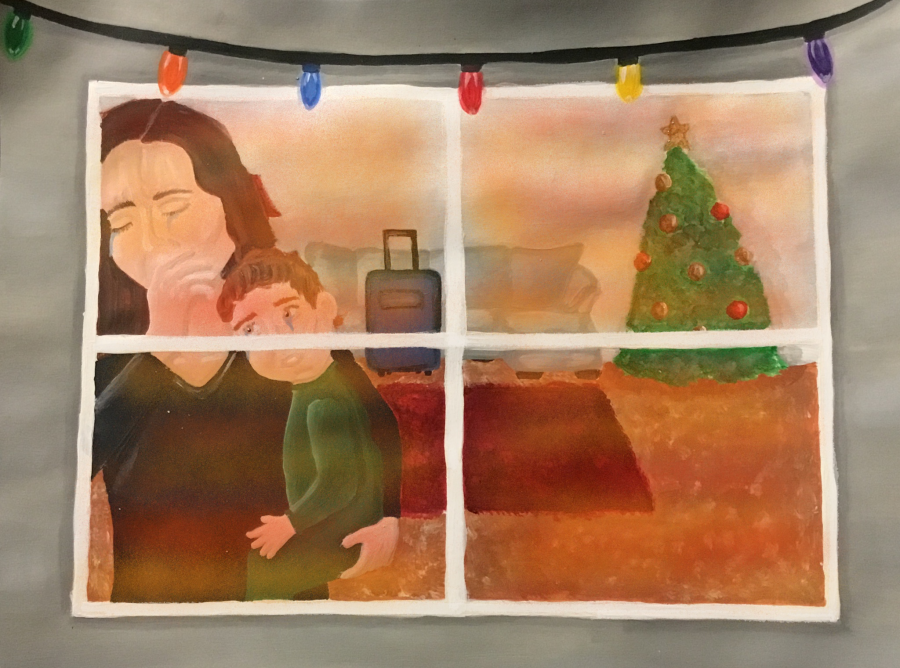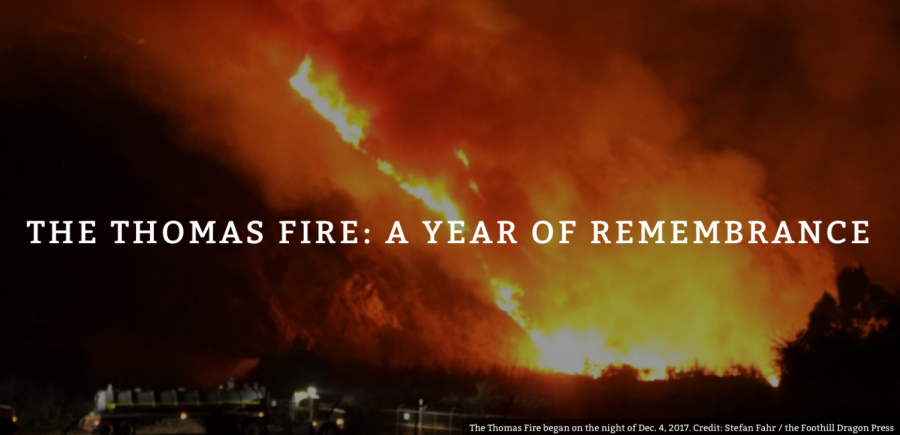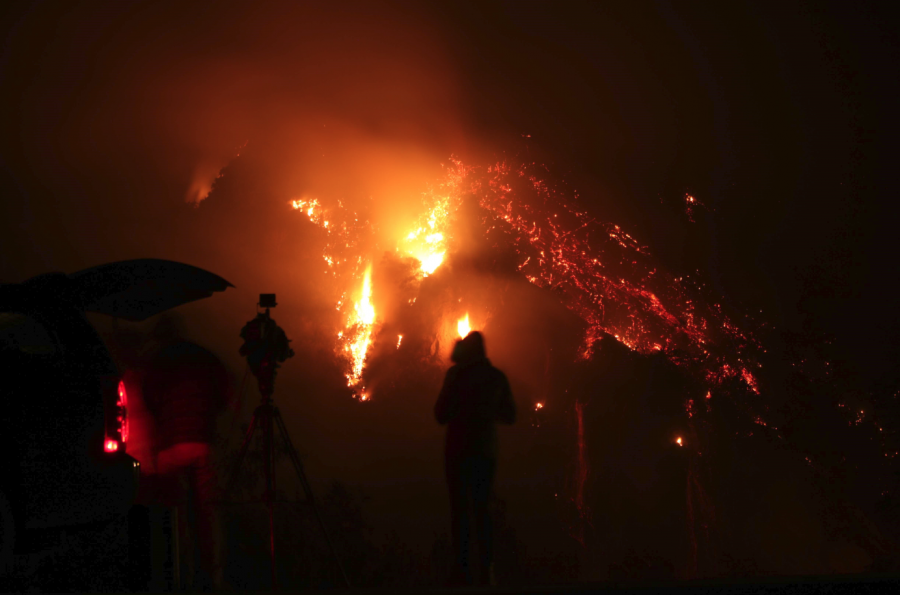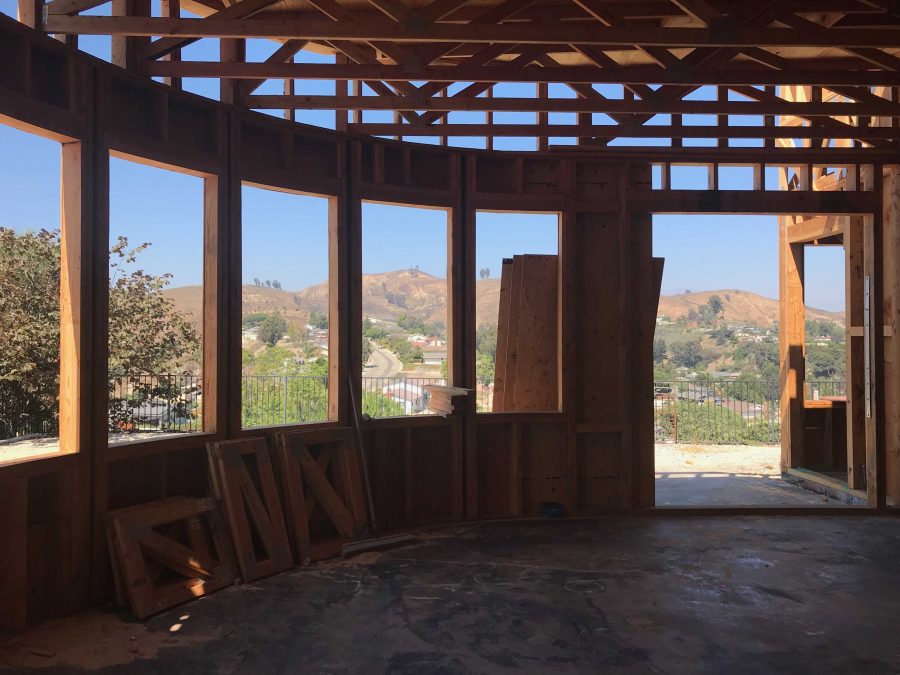At the beginning of the night on Dec. 4, 2017, Gunner Nagel ‘20 didn’t think the fire would get to his home on Via Ondulando. When he heard about the fire near Steckel Park—a place Nagel had gone to frequently for camping—it had just started, and he had no idea how big it might get. However, 20 minutes later, his parents told him to pack a bag just in case. Around 10:30 p.m., his family had packed what they wanted and were greeted by the blaring sound of bullhorns and evacuation orders.
“Around 11:30 p.m., we actually left. There’s only really one or two ways out of the neighborhood; it took us a half hour from where I was living,” Nagel said.
During the evacuation, his family truly believed and hoped that “it [was] no big deal, [they were] going to be back in a couple of days.”
They evacuated to his Aunt and Uncle’s house in Camarillo where they spent the night. “No one could sleep,” Nagel said.
By morning they were watching the local news, waiting for any reports on their neighborhood. At one point, the camera played footage of their street and passed by a neighbor’s house—two houses away from them—it was burned down. There was no view of their own home. “You were so much more emotional as you were waiting to see what was going to happen,” Nagel said.
Nagel talked about how hard the unknown was: “my mom and I were just so upset.”
It was scary for him not knowing what was happening, especially because he didn’t know if his home was still standing. It was also a tough time for his friends who lived around there too, who on top of this had been going through other problems; “I was stressed out for them,” Nagel said.
His family finally received news on their house when a close family friend had gone to check on the neighborhood. “All of [their friends’ houses] made it except for ours,” he said.
“At first, because I have a younger brother, he was so upset and I was just shocked. I mean, you can’t believe when that happens. You want to comfort other people, but you just don’t know what to do,” he said.
It took his family some time actually to process that their house had burned down; They were all in shock. However, they quickly had to start thinking about the future and what that meant for them. Nagel’s family had only brought a couple of days worth of clothes, and some pictures, along with their animals.
“It’s crazy thinking about everything you’ve ever known—I’ve lived there since I was really little—and it’s all gone. It’s devastating. But, I felt like it was more devastating seeing the city, for me it was almost as bad as seeing your own house be gone,” Nagel said.
In Ventura, people know each other so well, and the community is tight-knit. It meant so much to Nagel seeing the community come together and be so giving. Many of his friends, family and strangers donated to his family. Recollecting on old items that Nagel’s family owned brought up much emotion for him and his mom.
His baby grand piano, for example, had been with his family since Nagel was three and he didn’t remember a time before it. “There’s pictures of me playing it when I was little, and those things really got to me,” Nagel mentioned.
Although he lost his piano, he was able to grab his trombone and has an electric keyboard at the place he’s been staying. He feels that music has been helping him get through it all.
Nagel said that “the first couple of days I realized how much I was actually playing” and that he was playing hours at a time. Not because he had to, but because he wanted to.
Nagel’s family loves collecting and restoring antiques: they had a 1950 Air String Trailer, Honda Mini Bikes from the 60s and 70s, a Mustang, a 1968 Corvette, mid-century modern furniture and a 112-year-old baby grand piano that they lost. Even though these were all just material items, they held memories that were close to their hearts. “It’s the memories, you make a soul for things,” he said.
“You never think that the stuff around you is going to go away,” Nagel said.
Another thing that helped Nagel through this whole process was speaking with a therapist the school had hired.
“It released so much. I didn’t realize how emotional I was,” he confessed. “When I was telling the story before I was just constantly crying.”
It had been tough for him to talk about it because it brought back all his emotions from that night. “I felt so much better afterward,” Nagel said.
He has also come to realize how much support he has to give and how much others have to offer. At first, it was difficult for him to accept things that people were giving him because he considers himself an independent person, but then he realized “people want to do this for you and it’s so nice not having to worry about [asking for help]. I can just ask someone,” and they were more than willing to help out.
The community has come together to support one another. He described the number of people who have donated and helped his family along the way as amazing: “it makes you feel so good about where you live. I really love Ventura and I would never move,” Nagel said.
Another good part that came from the situation was that Nagel realized how much stuff he didn’t need. “I can do whatever I want and wear whatever I want and that’s what I’ve been doing,” he said.
Right now Nagel feels that “everything’s going pretty good.”
He’s currently staying with his Aunt and Uncle in Camarillo, but he and his family are planning to rebuild. They don’t know long it will take, but they are deeply attached to the area and love the space and privacy it offers.
This experience has been life-changing, but Nagel has grown from it too. “I feel better about myself; I feel better about where I live—my community,” Nagel said.
Since the fire, Ventura has been going through an external change while its citizens have been going through an internal one. So much has changed in Nagel’s life since then, “I don’t think my real character has changed as much, but I feel that how I perceive things [have],” he described.
“I’ve been happier; I don’t have as much to worry about,” he said. His family is renting a house in the same neighborhood they lived in before, from a neighbor who had planned to rent or sale even before the fire. She left them all the furniture.
They still plan to rebuild their home, but no construction has been started yet, “it’s been since April” that the lot was cleared, Nagel said. He’s not sure how long exactly the house will take, but he’s hoping by the end of his senior year.
Luckily for Nagel and his family, they have “guaranteed home replacement policy,” he remarked. They’ll be able to get what the house was originally going to cost to rebuild fully covered. “We’re going to do what we want now [with the house] and fix things that we didn’t like in the previous one.” However, he explained that trying to get insurance is a long process.
“It’s hard to see the neighborhood still because it’s so empty and it’s so quiet.”
The support system that Nagel has is powerful to him. “There’s so many people who still support me and there’s certain days which are really bad and certain days which are fine,” Nagel said. On bad days, he deals with it by talking it out with someone, to make the days more comfortable.
“There’s always been support,” Nagel said. He’s always tried to express his feelings with people and “because of that it’s a little easier,” he said. Now he’s trying to return the support and be there for others.
Nagel feels he has gained more empathy and sympathy toward others. “I think that I can relate to people easier and understand sadness a little easier,” especially with the more recent fires blazing in California, he is writing letters to some of the people who lost their homes.
The current fires in California have been hard for Nagel, “the similarities and the Santa Ana winds, [and] the smell. The smell drove me crazy,” he said. He has hard days, “just thinking about it and seeing the lot. That brings about a lot of emotion and certain pieces of furniture,” like his baby grand piano.
“But I realized stuff, it’s never going to be yours forever and I sort of needed to think about that it in this way so that it’s helped me overcome these difficulties,” Nagel said.
The course of one year helped him recognize that “there will always be bad days no matter what and there will be bad days thinking about other things. It’s just going to happen [and] not much I can do, but just hope for the best,” he said.
“Overall, I just really realized at least in Ventura County, there’s so much support and so many people that care.” It was scary seeing Ventura on national news for him, but he also realized how strong of a community we have from it.
“You don’t have to feel alone, and at first I really did,” because out of his friend group and most neighbors, he had been the one to lose his home. “I felt like none of them really understood, but they do,” Nagel said.
In a large-scale event, “people go through different things and understand things differently,” but they “will have the same type of sympathy and empathy towards you. Where they’ll do anything they can to help comfort you,” he said.
“It was hard for me to accept that. That people will want to help and you need to let them help you,” Nagel said. The school district had given many Target gift cards for food, clothes, anything they might need and others had donated.
The support people gave wasn’t just physical. The first week back at school, Nagel was still in shock over what had happened, but “they had the therapists and my counselor, Mrs. Freeman, was really great. She really helped me [by] being there for me,” he said.
He changed his schedule around a bit and tried to make his life a little more tolerable at that time. He dropped one of his honor classes, that didn’t matter as much for him and “not having to stress out as much and being able to really recollect what happened helped me mentally cool down,” Nagel said.
The Thomas Fire was almost a year ago now and “it’s a little weird, it’s like thinking about almost a loved one that’s past. Thinking about that like a whole year later, you’re like ‘it’s barely felt like any time since I’ve last seen them,’” he said. So much has changed for him.
His morals remain the same, but his perception to others feelings have grown enormously. It’s “a growth where I feel like I have this knowledge and this ability to feel certain things like this and feel other people’s pain [and] it’s made me a better person,” he said.
“I’ve really been able to make better connections with people, especially with friends, and being able to really have a lifelong connection with my friends and I […is] an amazing thing,” Nagel said.
When he thinks about it and how it can relate to multiple parts of where he is now in his life, “it’s really empowering. Being able to be myself. I feel like I’ve been more of my genuine self now than I was,” Nagel expressed.
For others dealing with loss from the recent fires, he says, “it gets better.”
“At first you’ll feel so much you won’t know how to react. You’ll walk through stores and you’ll cry seeing stuff that you had,” because the most challenging thing to deal with is the memory of an item.
“That’s the hard part, dealing with the connection [of] things. People I feel like especially after this happens, people feel so connected to their stuff that they almost get taken over by it,” he said.
“My best piece of advice would be, it gets better and you have to realize that it’s not your fault, you couldn’t have done anything,” Nagel said.
If you’re going through something challenging, “you don’t always need to push people away and just say you’re fine,” he said. For him, it’s been relieving to be more genuine with others and himself.
His relationships with others have been what has helped him through. Nagel believes “connections with people and love is so much more than stuff; Having that humanity and that real sense of genuine love is so much more important than love for stuff.”
He has found more of who he is with less and discovered “how much easier it is now having less to [still] be happy.”
“My stuff isn’t me. My stuff doesn’t hold parts of me,” he said. All he has to show for the type of person he is is himself. “It’s just nicer to represent who I am, not just represent [who I am] through stuff,” Nagel concluded.


